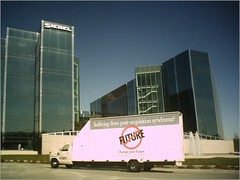“I am the jigsaw.” – R.Z.
I have to disagree, relatively strongly, with a number of items in Dave Taylor’s post “When Is A Blog Too Personal?” Dave writes:
“One of the great ongoing debates in the murky world of blogging is whether your weblog should be personal or professional, whether you should be revealing or private. There are, of course, many different answers and at some level the real answer is “whatever you’re comfortable with”, but I think it’s a topic worth exploration nonetheless.
Business blogging is a different story because your goal is to convey a certain level of expertise, credibility and, yes, professionalism, and that can be counter to the idea of being too personal.
One solution is to use the “water cooler rule”. If a topic isn’t something you’d talk about with your supervisor hanging around the water cooler or coffee station at your office, it’s probably not appropriate for your professional blog either.
That might work pretty well for you, but I don’t think it goes far enough, because I can easily imagine chatting about the latest TV show or sporting event with colleagues and supervisors, but that doesn’t mean it’s a good fit for my business blog.”
I actually think the “water cooler rule” is a pretty good one. However, Dave continues:
“I have a friend who is a professional editor and writer who is also in what she calls an “alternative relationship” where she and her husband both date other people. It works for her, but when she blogged about her relationship on her professional blog, I was shocked.
She said that “I’d rather just ‘out’ myself and if it turns off potential clients, I probably wouldn’t have wanted to work with them anyway.” I just don’t see it that way. When you buy a burger from the local eatery, do you want to know the politics of the owner? When you get your car tuned up at the local garage, do you even care about the religious background of the mechanic?”
Here is where we disagree, strongly. When choosing a service provider, I absolutely want to know his or her context and worldview, biases and motivations, whenever possible.
Exhibit A: I will never get a Domino’s pizza, because I disagree strongly with founder Tom Monaghan’s politics.
Exhibit B: I really like the Magnolia pub, in the Haight in San Francisco. Not only do they have terrific beer, but their menu tells me this about the philosophy of the owners:
“Magnolia is proud to support sustainable agriculture as well as local farms and businesses in order to serve food that tastes better. We buy as much of our produce as possible from independent, local, organic farms based on seasonal availability. Our meat and poultry is all natural, free range, and raised without the use of hormones or antibiotics. We make sure that our seafood choices are abundant and fished or farmed in sustainable ways. In general, we buy as locally and sustainably as possible and encourage you to do the same.”
So I suppose, yes, I do want to know the politics of the owner of the burger joint. (n.b. That said, there are a whole bunch of waypoints from transactions to community.)
We’re all jigsaw puzzles of varying interests, history, background and, yes, skills. For some, the Joe Friday, “just the facts” approach may be what they desire from their vendors. On the other hand, many of us spend at least a third (ha, right…more like two-thirds) of our days in our “professional” skins. Do we really want to be denying all of those aspects of “who we are” a majority of our lives? I think not, so Dave, I need to respectfully disagree with your post.
Some other viewpoints on humanity and business blogging:
- Shel Holtz: “Business, Humanity and Blogs”
- Jory DesJardins: “How To Get Naked” (bonus link: Survey – Sex and Money Still Taboo)
From the archives:
The Business Blogging Field Guide (HTML, or PDF)



